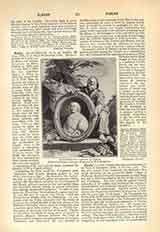

Fleury, ANDRE-HERCULE DE, b. at Lodeve, June 26, 1653; d. at Paris, January 29, 1743. He was a protege of Cardinal de Bonzi and became chaplain to Maria Theresa in 1679, and to Louis XIV in 1683. He was appointed Bishop of Frejus in 1698, but resigned the see in 1715, when he received the Abbey of Tournus and was appointed tutor to the young Louis XV. Naturally cold and imperturbable, he remained in the back-ground during the regency. When Louis XV attained his majority in 1723, it was at the instance of Fleury that the Duc de Bourbon was made prime minister, and quarrelling with the duke, Fleury pretended to retire to Issy. Louis XV, however, who admired and loved his tutor, sent the duke into exile, and entrusted the government to Fleury. True to his habits of discretion, and accustomed, as Duclos says, “to bridle the envious”, he never assumed the title of prime minister. He was made cardinal in September, 1726, and until his death remained the guiding spirit in French politics.
Comparing the three cardinals, d’Argenson said: “Richelieu bled France, Mazarin purged it, and Fleury put it on a diet”. He alluded in this bantering way to the cardinal’s policy of economy which, among other drawbacks, retarded the development of the French military marine at the very period when the mercantile marine, thanks to private enterprise, was making considerable progress. In spite of this, however, Fleury had the qualities of a great minister. He was the first to foresee that France would not always be at enmity with the Hapsburgs. In connection with the Polish succession and the Duchy of Lorraine, he availed himself of the able advice of the diplomat Chauvelin, when it became necessary to play a cautious game with Austria. But, as Vandal says, the policy of Chauvelin was that of the past. Fleury, in redoubling his efforts to bring about as quickly as possible pleasant relations between the King of France and the emperor, was the precursor of Choiseul, Vergennes, and Talleyrand. He was accused of timidity when at the outbreak of the War of the Austrian Succession he wrote a letter to General Konigseek, in which he seemed to apologize for this war. But, in truth, Fleury was simply anticipating the policy of the renversement des alliances (breaking up of the alliances), which began in 1756, and which by uniting France and Austria was to be more in conformity with the Catholic traditions of both countries. The opinion of historians like Vandal and Masson with regard to this renversement des alliances, so long the object of criticism, tends to justify Cardinal Fleury.
During the period of Fleury’s power Jansenism was gaining ground among the masses as a superstitious sect, as is evidenced by the miracles of the deacon Paris, while among the upper classes it took shape as a political faction. Fleury was the minister who had to contend with a Jansenist opposition in the Parliament of Paris. He reserved to royal authority all matters relating to the Jansenists, one consequence of which was a “strike” on the part of the magistrates and lawyers, which Fleury repressed by certain measures of severity. He became a member of the Academy in 1717 and was the first to propose sending a scientific expedition to the far north and to Peru to measure the degrees of the meridian.
GEORGES GOYAU

